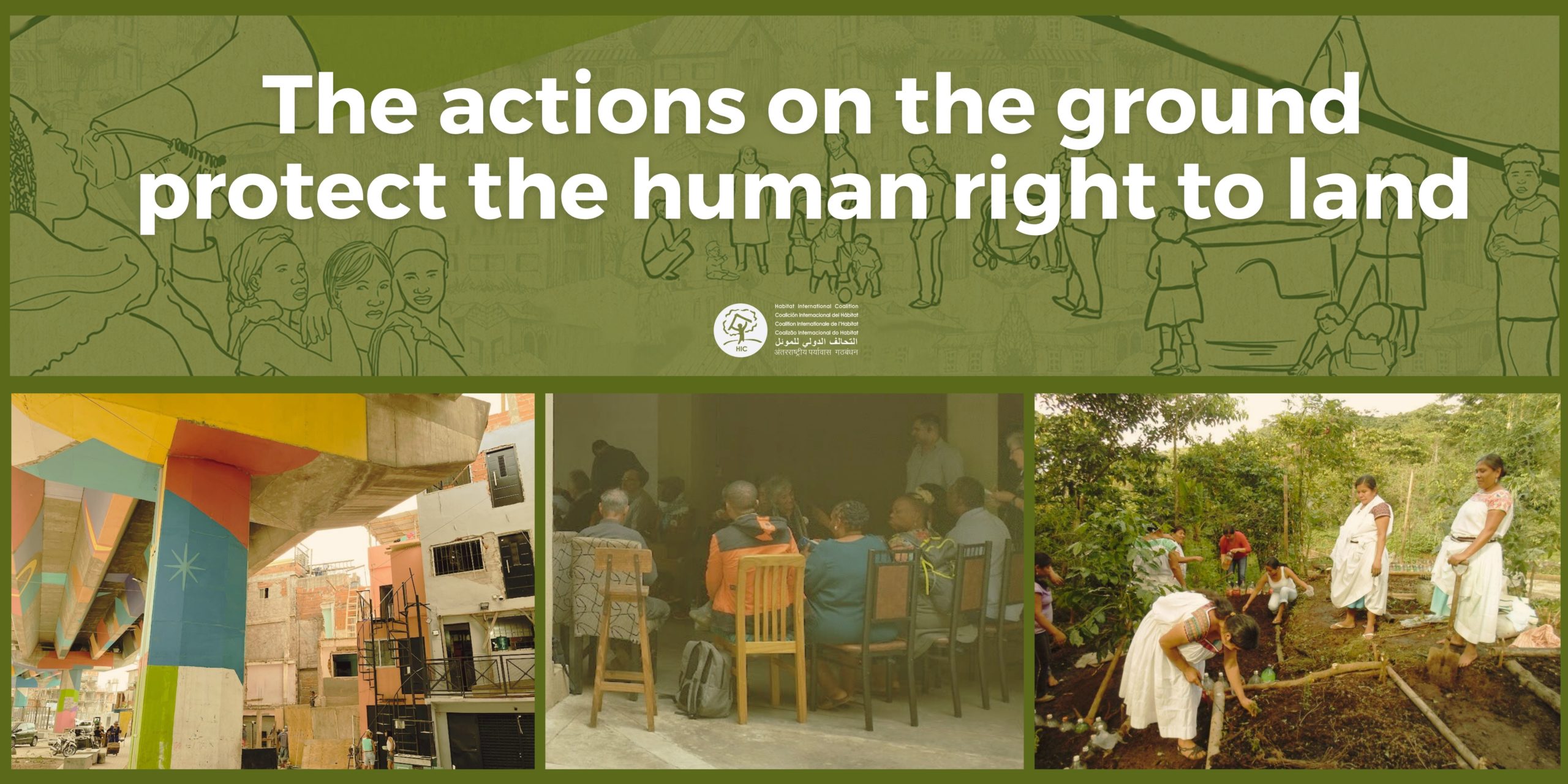Let’s recognise, protect and fulfill the human right to land for inclusive, sustainable and fair economies!

HIC President Message – World Habitat Day 2023
What is the right to land
Land is a human right! It’s time for the United Nations to recognize it as such
Land is not a commodity

Sustainable and equitable access to, use of, and control over land

Land is a universal human right that needs to be formally recognized.

Land is central to democratic management, equal access and enjoyment of territories,
What we are calling for
While the human right to land is yet to be recognised, there has been increasing international recognition of the importance of land (access to, use of and control over) for the enjoyment of other basic human rights:

2022
General Comment 26 of the Committee on Economic, Social and Cultural Rights
The GC No 26 is an important great advancement that recognizes individual, collective, domestic and extraterritorial obligations of states – including their role in multilateral development institutions and development banks -to regulate private interests in the formation of legislation and public policy, thereby preventing and combating corporate capture and other forms of corruption.
However, the General Comment does not yet reference:
- protecting the social function of land.
- possible frameworks for advancing towards democratic management of land.
- human right to land in urban settings.
Both the United Nations and governments at multiple spheres can contribute to recognizing, protecting and fulfilling the human right to land by:
1) Implementing robust national land policies to ensure land for the most impoverished populations
2) Preventing and protecting against violations of the human right to land
3) Mainstreaming the role of land in public policies
What civil society is doing
Cooperación comunitaria campaign on land, Mexico
Cooperación comunitaria supports social production of habitat initiatives in rural areas of Mexico, from a sociocultural, productive, constructive and territorial-environmental perspective, preserving and recovering traditional knowledge. Land plays a mjor role in their work, from the right to housing, to right to food and water. Moreover, the organization and its partners advocate for special frameworks to be set in place for rural land and the communities that live in it.
For more info, click here.
Nuestros Barrios campaign, HIC AL, regional campaign
A campaign of collective demands for the improvement and socio-urban integration of Latin America’s working-class neighbourhoods
For more info, click here.
Co-learning space on land rights
Over a year ago, through a facilitated mutual-learning process, HIC Members came together to exchange knowledge and experiences towards advocacy on the human rights dimensions of land and its realization across rural/urban territories, beyond traditional focus on private property. At the heart of the co-learning process is critical pedagogy that encourages the collaborative and social nature of learning, enhances communication, critical consciousness and collective ways of thinking & doing amongst HIC members and allies The participants of this co-learning space helped with their interventions to build a strategy against colonialism, land concentration, violent evictions and habitat destruction.
For more info, visit the website dedicated to the podcasts of the co-learning spaces.
Community Land Trusts publication
Report by UN-Habitat which explores the CLT concept and history, explains how it works, and offers a series of successful CLT case studies in urban and rural areas.
For more info, click here.
Dudley Street Neighborhood Initiative's (DSNI)
We empower residents of the Dudley Neighborhood of Roxbury and North Dorchester to organize, plan for, create and control a vibrant, diverse and high-quality neighborhood in collaboration with community partners.
For more info, click here.
Tamazight : le droit à la terre et à l'histoire
On August 9, we organized a conference entitled “Tamazight: the right to land and history”, on the occasion of World Indigenous Peoples’ Day, in the presence of university professors and human rights activists.
For more info, click here.
The Land Portal
The Land Portal Foundation offers resources and tools to enhance understanding of land rights and governance, supporting informed decision-making by communities.
For more info, visit: https://landportal.org
International Land Coalition
The International Land Coalition (ILC) collaborates with indigenous and local communities to strengthen their land rights, such as the “Our Land Our Business” initiative.
For more info, visit: https://landcoalition.org
Zimbabwe land reform program
Zimbabwe’s Land Reform Programme has opened up access to land-based resources for over five million black Zimbabweans – land that had formerly been in the hands of white commercial farmers. But in 2012, human rights violations perpetrated during the reforms led to the formation of the Zimbabwe People’s Land Rights Movement – a movement that has successfully defended the rights of 10,000 families.
For more info, visit: https://zimlandrightsmovement.wordpress.com/
Bodies that resist: the women who sustain the protest in Jujuy
Women of indigenous peoples and peasant women who seek to defend the lands and natural resources not only of their communities, but also of those who are natural resources not only of their communities, but also of those that belong to all of us, all of us, and all of us, and that are threatened by the advance of that belong to all of us and that are threatened by the advance of extractivism proposed by the new constitution. extractivism proposed by the new constitution.
For more info, visit this link
Argentina's Law on Land Regularisation and Social and Urban Integration (popular neighbourhoods)
Argentina’s Law for the Regularisation of Ownership and Social and Urban Integration (popular neighbourhoods), which, with the aim of proceeding with their urban integration, declares the totality of the real estate on which the Popular Neighbourhoods are located to be of public utility and subject to expropriation, and which is recorded in the National Register of Popular Neighbourhoods (RENABAP).
For more info, click here.
Guidelines for the urbanisation of popular neighbourhoods of the HABITAR Argentina's Commission of Popular Neighbourhoods.
They systematise the main guidelines for intervention processes in these neighbourhoods in order to guarantee a rights-based approach, respectful of collective constructions and community identities, based on an inclusive logic in the elaboration of agreements with the inhabitants and organisations of these communities.
For more info, click here.
Favelas Community Land Trust (FTC) Project in Brazil
Developed by Catalytic Communities in partnership with several public agencies, private institutions, universities and community leaders, it is inspired by the model born in the United States in 1960 and today present in several countries around the world. The experience of the Caño Martin Peña communities in Puerto Rico inspired the adaptation in Brazil, which was called Termo Territorial Collective to underline its consensual character and free expression of will – an agreement -, the territory as the object on which it is intended to work and, finally, its community aspect and form of collective organisation, which seeks to guarantee security of tenure in the face of eviction processes by the State or real estate speculation and gentrification.
For more info, click here.
Zero Evictions Campaign
Made up of dozens of Brazilian civil society organisations, it has carried out numerous initiatives to suspend evictions and removals. These include a mapping of cases, a practical guide on how to deal with evictions or removals, and a reflection on how to legally argue the human rights violations they provoke.
For more info, click here.
What you can do
Join HIC Members in the call to recognise the human right to land.
Click here to see the strategy and the materials of the campaign.







